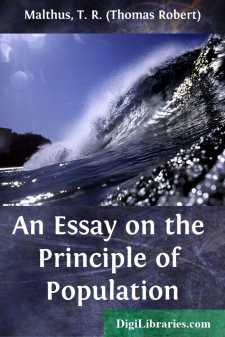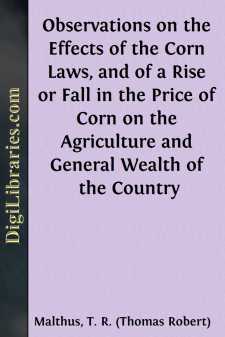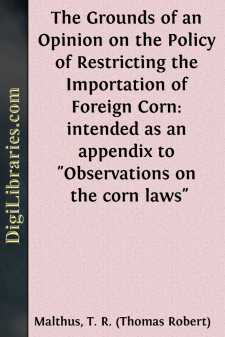Categories
- Antiques & Collectibles 13
- Architecture 36
- Art 48
- Bibles 22
- Biography & Autobiography 813
- Body, Mind & Spirit 142
- Business & Economics 28
- Children's Books 16
- Children's Fiction 13
- Computers 4
- Cooking 94
- Crafts & Hobbies 4
- Drama 346
- Education 46
- Family & Relationships 57
- Fiction 11829
- Games 19
- Gardening 17
- Health & Fitness 34
- History 1377
- House & Home 1
- Humor 147
- Juvenile Fiction 1873
- Juvenile Nonfiction 202
- Language Arts & Disciplines 88
- Law 16
- Literary Collections 686
- Literary Criticism 179
- Mathematics 13
- Medical 41
- Music 40
- Nature 179
- Non-Classifiable 1768
- Performing Arts 7
- Periodicals 1453
- Philosophy 64
- Photography 2
- Poetry 896
- Political Science 203
- Psychology 42
- Reference 154
- Religion 513
- Science 126
- Self-Help 84
- Social Science 81
- Sports & Recreation 34
- Study Aids 3
- Technology & Engineering 59
- Transportation 23
- Travel 463
- True Crime 29
An Essay on the Principle of Population
Categories:
Description:
Excerpt
CHAPTER 1
Question stated—Little prospect of a determination of it, from the enmity of the opposing parties—The principal argument against the perfectibility of man and of society has never been fairly answered—Nature of the difficulty arising from population—Outline of the principal argument of the Essay
The great and unlooked for discoveries that have taken place of late years in natural philosophy, the increasing diffusion of general knowledge from the extension of the art of printing, the ardent and unshackled spirit of inquiry that prevails throughout the lettered and even unlettered world, the new and extraordinary lights that have been thrown on political subjects which dazzle and astonish the understanding, and particularly that tremendous phenomenon in the political horizon, the French Revolution, which, like a blazing comet, seems destined either to inspire with fresh life and vigour, or to scorch up and destroy the shrinking inhabitants of the earth, have all concurred to lead many able men into the opinion that we were touching on a period big with the most important changes, changes that would in some measure be decisive of the future fate of mankind.
It has been said that the great question is now at issue, whether man shall henceforth start forwards with accelerated velocity towards illimitable, and hitherto unconceived improvement, or be condemned to a perpetual oscillation between happiness and misery, and after every effort remain still at an immeasurable distance from the wished-for goal.
Yet, anxiously as every friend of mankind must look forwards to the termination of this painful suspense, and eagerly as the inquiring mind would hail every ray of light that might assist its view into futurity, it is much to be lamented that the writers on each side of this momentous question still keep far aloof from each other. Their mutual arguments do not meet with a candid examination. The question is not brought to rest on fewer points, and even in theory scarcely seems to be approaching to a decision.
The advocate for the present order of things is apt to treat the sect of speculative philosophers either as a set of artful and designing knaves who preach up ardent benevolence and draw captivating pictures of a happier state of society only the better to enable them to destroy the present establishments and to forward their own deep-laid schemes of ambition, or as wild and mad-headed enthusiasts whose silly speculations and absurd paradoxes are not worthy the attention of any reasonable man.
The advocate for the perfectibility of man, and of society, retorts on the defender of establishments a more than equal contempt. He brands him as the slave of the most miserable and narrow prejudices; or as the defender of the abuses of civil society only because he profits by them. He paints him either as a character who prostitutes his understanding to his interest, or as one whose powers of mind are not of a size to grasp any thing great and noble, who cannot see above five yards before him, and who must therefore be utterly unable to take in the views of the enlightened benefactor of mankind....





